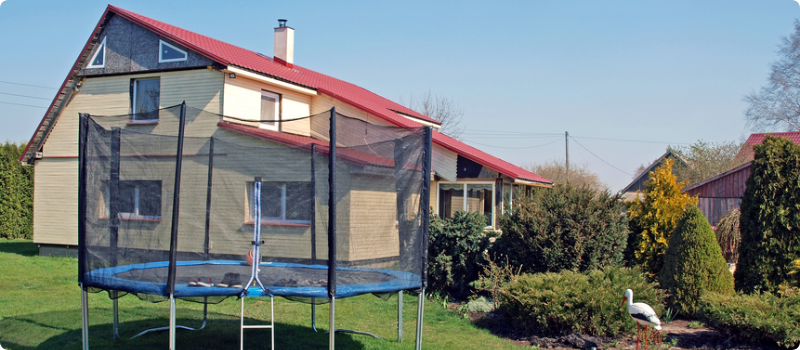Why Did My Homeowners Insurance Go Up?
Updated February 12, 2024 . AmFam Team
A lot of thought went into purchasing your home. Its amenities, location and overall design played an important role in your decision to place an offer on it. Many of those traits and features are considered when an insurance company builds your homeowners quote. Insurers also use other factors, such as your home security system, to determine the cost of your premium.
Are you wondering, “Why did my homeowners insurance go up?” You’re not alone. Learning your rates have risen can be surprising. It may be because your property has increased in value. Perhaps you invested in an addition, such as a new room or deck, boosting your home’s worth. It could also increase if you filed a claim on your home last year. This article addressed common reasons your home's insurance rates may have increased and some helpful discounts that may help lower your premium.
Why Homeowners Insurance Rates Go Up
Does homeowners insurance go up every year? That depends on several conditions and circumstances. Here are five reasons your premiums may increase — so you can better understand your insurance company's reasons for updating your homeowners premium.
1: Filing Claims May Mean Higher Premiums
You buy insurance to help offset the cost of major expenses if the unexpected should happen. When it does, you’ll be glad to have coverage. But if you file a claim on your homeowners policy, your rates may increase.
When something happens, you may ask yourself, “How much will my homeowners insurance increase if I file a claim?” Given that claims range from the small (think replacing a broken window) to the large (think reconstructing your kitchen after a fire), it may depend on your total claim cost.
Every claim could affect your premium, so if you’re considering filing a small claim for a loss that may not cost more than your deductible — it may be wise to pay it out of pocket. You can always contact your agent with questions before filing a claim. They can help you assess whether the type of claim you’re considering is worth filing.

2: Property Changes & Attractive Nuisances
Your home’s square footage impacts your homeowners insurance quote. Because adding new rooms to your home can boost its value, you may see a homeowners insurance increase when you update your property's details with your insurance company. The new area won't be covered if you fail to update the information, and/or you may lose your policy altogether if your insurer learns that your home's details are inaccurate.
Moreover, suppose you’ve made significant investments in home improvement and updated your kitchen. In that case, replacing those expensive new features will now cost more per square foot.
When your property has a swimming pool or a trampoline, insurance companies consider them “attractive nuisances” that can pose a higher risk than homes without them. Even backyard playsets can fall into that category.
So, you may find a rate increase after adding attractive nuisances to your property because you may be held liable if someone injures themselves in your pool or on your swing set. But if you’ve taken steps to prevent accidents, such as installing a fence around your new pool, that may help reduce your rate increase.
3: Inflation Strikes Again
As inflation increases, insurance companies respond by raising rates. That’s because your home and belongings will now cost more to replace. The insurance industry references the Consumer Price Index to measure inflation and adjusts rates accordingly. It’s one reason property owners find that their home insurance keeps going up every year, even if nothing’s changed on their property.

4: Construction Costs in Your Area Affect Your Rebuild Cost
When severe weather damages your home, you may need to rebuild or replace it. Unfortunately, when catastrophic weather hits, many homes in the area can be impacted, which may create a spike in the cost of construction materials. As you might expect, laborers are in higher demand in those areas, and their rates typically escalate in the aftermath of a hurricane, wildfire or tornado. If you have an older home, rebuilding it according to modern building codes can be costly.
5: Increased Storm Activity
Severe weather has risen in recent years, and it isn't limited to tornadoes and hurricanes. Hailstorms (Opens in a new tab) and windstorms (Opens in a new tab) are also becoming more frequent and violent.
Increased weather damage may lead to more insurance claims. This shift is beyond the control of insurance companies, forcing them to adjust. Rates might rise as a result.
6: Your Insurance Score Dropped
Your insurance score is similar to your credit score — but for insurance purposes. Its calculation is based on your likelihood of filing a claim during a given coverage period, making it a key component used to help develop your total premium.
Databases containing details on your previous property claims are used to help determine your premium. Your credit history is also part of that calculation, so improving your credit score may help reduce your home insurance premiums. These factors are also considered when building your auto insurance score and quote.
How to Lower Your Homeowners Bill
You may be able to lower your insurance premium in several ways. Bundling your insurance policies and/or going paperless are excellent ways to save. Enrolling in paperless billing through My Account (Opens in a new tab) or the MyAmFam app also allows you to access your policies, insurance cards and bill-paying options, such as paying your premium in full, which may help you save more money.
Making adjustments to your home, like installing an impact-rated roof or smart home security system, may help you save even more on your premium.
So, if you're left wondering why your homeowners insurance keeps going up, contact your American Family Insurance agent to learn more about how your coverages, deductibles and policy limits affect your rates. They may be able to help you optimize your policy for maximum savings, too.
Don't have the MyAmFam app? Download it today:
 (Opens in a new tab)
(Opens in a new tab) 
This article is for informational purposes only and based on information that is widely available. This information does not, and is not intended to, constitute legal or financial advice. You should contact a professional for advice specific to your situation.

